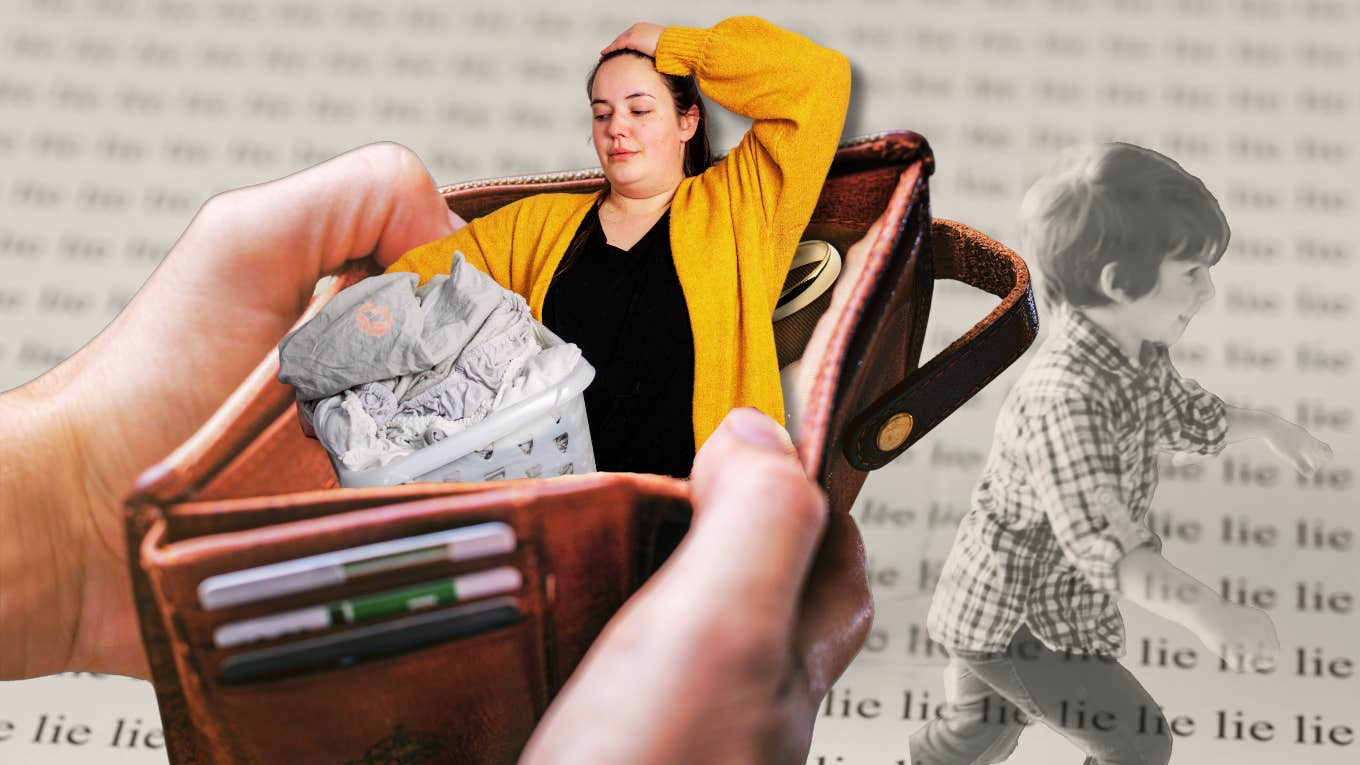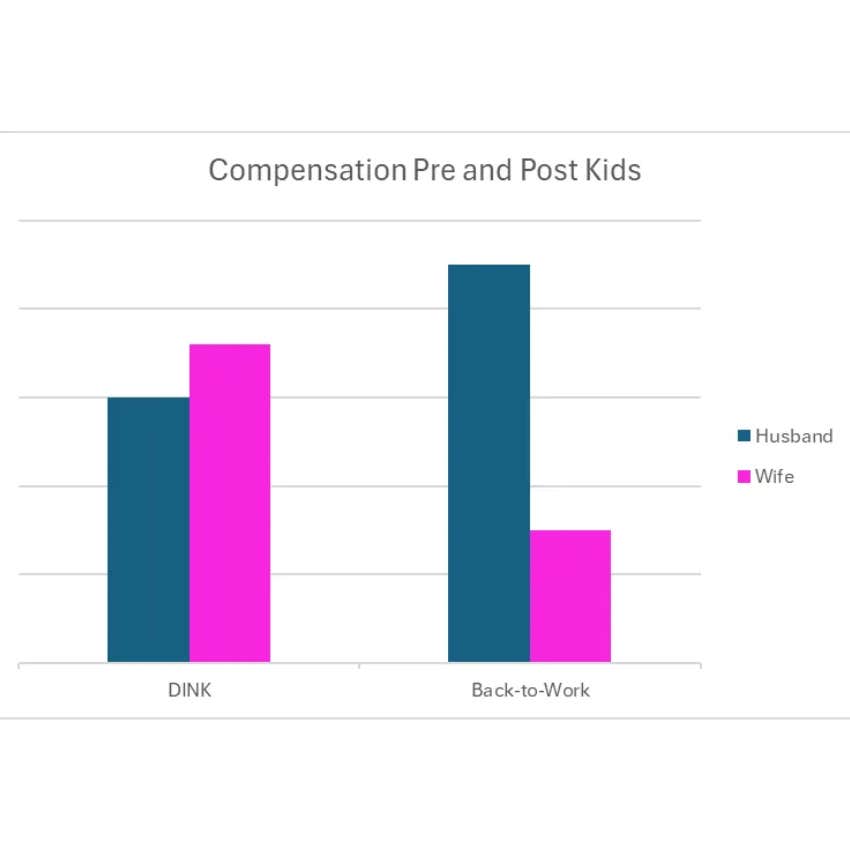Why I'm Returning To Work After 14 Years At Home With My Kids
The diabolical lie about being a stay-at-home mom.
 photoschmidt, andsxx, Ekaterina79 | Canva, DaanR91 | Shutterstock
photoschmidt, andsxx, Ekaterina79 | Canva, DaanR91 | Shutterstock Kansas City Chiefs kicker Harrison Butker recently made controversial comments at a college commencement. He insinuated that women would feel most fulfilled in their mother and homemaker roles rather than in the workplace. He went on to reference his wife, Isabelle, as being the primary caretaker of their children. Through her role as a homemaker, he argued she is happier and will attain salvation.
Butker’s comments echo the “trad wives” movement on TikTok where women post about the benefits of being traditional wives. These videos highlight women taking on traditional roles of being the homemaker and primary caretaker while the husband is the primary wage earner.
As a stay-at-home parent, I don’t judge anyone for choosing career or child-rearing. Part of being a feminist is valuing that women have the independence to make their own choices. My qualm with the “traditional wives” movement and comments like Butker’s is they lead young women to believe that if they choose family over themselves everything will be copacetic. If they take care of their family, they will be protected.
Sadly, that is not always the case. Choosing to be a stay-at-home parent has risks that might not show up for years. As you age, it becomes harder to acclimate back into the workforce if your situation changes.
My work as a volunteer lawyer in the family law space and seeing how little the law protects stay-at-home parents has motivated me to return to full-time work. I have taken care of my husband and my children for fourteen years, and now I need to take care of myself.
The real diabolical lie: you’ll be happy forever
About his wife, Butker said of his wife, “[her] dream of having a career might not have come true, but if you asked her today if she has any regrets about her decision, she would laugh out loud, without hesitation, and say, ‘Heck, No.’”
This piqued my interest. How does he know what she would say? More importantly, what would his wife think in five or ten years? What would she think if Harrison opted to leave her? What if she found herself in a situation where she wanted to leave and couldn’t afford to financially?
As a stay-at-home parent, I agree there is value in being home with my children — a value men can equally obtain if they take on the homemaker role. But there is also vulnerability. It’s very easy for someone like Harrison to gloss over the negatives.
The laws in many states are shifting to not protect stay-at-home parents. For instance, in 2023, Florida changed their law now mandating child custody be split 50/50 regardless of who is the primary caretaker. Since child support is based on overnights, under the new guidelines, former stay-at-home spouses often obtain limited child support. Florida Statute 61.08 also abolished alimony for life for spouses married longer than 17 years and made it harder to obtain alimony.
The current running through these laws is that men and women are equally capable of both child rearing and earning money outside the home. However, it negates how not working impacts the stay-at-home parent’s earning potential.
As a volunteer lawyer with a legal aid organization in Florida, I saw firsthand how the law could be used as a sword instead of a shield. More importantly, I had a very close family member, whom I’ll refer to as Tammy, whose life was turned upside down after she chose to be a homemaker. Tammy wants her story to be told.
When the shoe falls and your marriage ends
Tammy married her husband in 2005. They had two children and Tammy had one from a prior relationship. Tammy had a home she purchased as a single parent before meeting her husband.
Tammy returned to work as a waitress two weeks after having their daughter because her husband was unemployed. A few months later, Tammy supported him and the household while he completed a government training program. Tammy invested in her husband’s career so that he could provide a reliable family income, leaving her to be the primary home and caretaker and working a couple of waitressing shifts a week. Tammy never thought to invest in her career.
Once Tammy hit forty, her husband left her, their two children, and their home for a twenty-four-year-old he met at his job. At this time, her husband’s income was three times higher than hers.
While the divorce was pending, he paid no child support for two years. He did not pay the mortgage, instead, he chose to live with his mother. Tammy could barely survive. She relied on the help of her family and friends — all of which had to testify in open court that they helped her when he tried to argue their financial support should limit his child support.
Tammy called me crying multiple times
He took over her SUV because she could not afford the payment. (Since he was living with his mother, he could afford the payment.) She could not understand how while she did everything for her children and her family, there was no protection for her.
Pre-trial, the judge advised the lawyers that it was a “50/50 case all day long,” meaning the custody and house would be split in half. It did not matter that she purchased the marital home before the marriage because she had refinanced it with his name.
It did not matter that he abandoned the home and paid no bills for two years. This afforded him the ability to pay for a lawyer. Tammy had to rely on her mother to pay for a lawyer when self-representation became too complicated. It did not matter that he had never taken either of the children to the doctor or school, or that in the two years living with his mother, he did nothing to secure them a proper place to sleep while in his care.
All Tammy wanted was to stay in the marital home she paid for the last two years until the youngest child turned eighteen. But she was advised the judge felt the home needed to be sold so her husband could provide the children with bedrooms. However, since Tammy’s income is one-third that of her husband’s, it is unclear whether she will qualify for another mortgage. Tammy is now living at her mother’s house.
Tammy was told she didn’t qualify for alimony because she rented her garage to her boyfriend to store his old car to make some cash. Florida law is one of the only states that can negate alimony by not just marrying or cohabitating, but by being in a “supportive” relationship with a paramour. Tammy was defeated.
She said, “I walked into this marriage with a house and a car and I’m walking out with neither.” That was a tough pill for her to swallow. She had relied on him and he failed her. More so, the laws failed her. Her cheating husband just got to walk away without any repercussions. Her experience was eye-opening.
Walking away on unequal footing
Choosing your family over yourself can come at a cost that the law does not recognize. While investing in her husband’s career and helping him advance at work, Tammy had not done the same for herself. Her income potential is a fraction of his, yet she’s now expected to support herself and her children. This is terrifying.
On the “trad wives” TikTok videos many women commented that they too had been left high and dry after being a “traditional wife.” One woman said since her husband had full control, it led to financial abuse and warned other women to plan for the inevitable.
I never strived to be a “traditional wife.” My mother, my grandmother, and my great-grandmother all worked as nurses. On my father’s side, my Abuelita had nine children and worked selling her farm-grown vegetables. After having a miscarriage during my stressful corporate law job, my husband and I decided I would be a stay-at-home parent.
At the time, we had equal earning potential. I even earned more than him. Fourteen years later with me being a homemaker, that is no longer the case. The below illustrates how far my income potential has fallen and how much my husband’s has risen.
 Graphic from author by Kevinschmid
Graphic from author by Kevinschmid
A few years ago, when I applied to a few jobs, I heard crickets back from law firms with attorney vacancies. I received an interview at a top firm for a pharmaceutical attorney position with my exact skill level. Two days before the interview, they called to say the interview would now be over the phone. The day of the interview they cancelled completely. It was clear the partner had realized I had not practiced in several years and was no longer interested.
While I value my time with my children, it is not clear that society values it. I held the corporate ladder for my husband to climb. I watched his income potential skyrocket while mine plummeted. If he leaves me, the law considers his income potential his asset, not mine. I have to secure my own. Luckily, my husband is one of the good ones (well, so far).
I started writing a few years ago in the hope of landing a traditional publishing deal. Wanting me to succeed, he has read, edited, and helped me with all of my books. He will read this article twice at least. But without a publishing deal on the horizon, I’m accepting a full-time lawyer job. It is for less than half of what I used to make, but it is a start. A friend of mine asked why I needed the job. I responded with, “For money. I can’t be vulnerable if my husband leaves me.” He seemed perplexed because my husband earns a good living.
My friend believes part of being married is being vulnerable with your partner, and I should trust my husband. But economic vulnerability is heart-wrenching. I will never forget what Tammy endured. She fought for her children and her family, and no one fought for her.
Stay-at-home parents should know and protect your rights
While Butker’s wife might be content now, I advise her, “traditional wives,” and stay-at-home parents to know their rights and protect them. Make your spouses sign prenuptial or postnuptial agreements that guarantee you alimony. Also, consider keeping one toe in something that can help you should you need to return to work. Keep your skills sharp.
My current job offer came from a contact at the legal aid organization I assisted part-time. I’m also fortunate I earned my law degree before I had children. Even if you think everything will be wonderful and amazing, you can’t predict the future. Plan for the unexpected. Protect yourself.
Julie Calidonio is a writer, lawyer, and mother. Her essays published in Scary Mommy, Motherly and Medium highlight her comedic yet poignant writing style.

